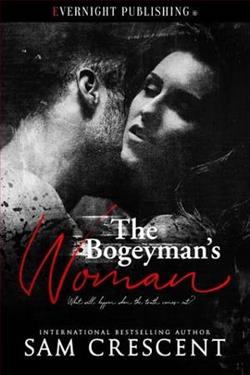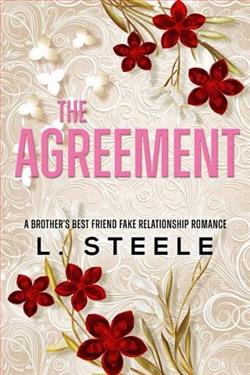Page 62 of We Are All Guilty Here
Emmy opened her mouth to agree with him, but all the excuses were drowned out by memories of last night’s episode. The senseless, bloodcurdling cries that sounded like a siren. Emmy jumping out of bed. Gerald careening down the hallway. Cole rushing in to help. Emmy holding her mother while she sobbed, then standing with her back against the door when Myrna had started railing against the strangers who had broken into her home.
She hadn’t recognized any of them in over three months.
Myrna had known that this would happen. She’d been an English teacher for over fifty years. She knew how to research a topic. She’d become an expert in the stages of Alzheimer’s. She knew the horrors that the late stage could bring. Emmy couldstill remember her mother reading aloud from the list she’d made in one of her school notebooks. Myrna had catalogued all the things she did not want for herself or for her family: juggling their schedules, rushing around, changing plans, taking time off work, skipping celebrations and milestones and time with their families and friends, figuring out the medications and doctor appointments and tests, pushing through the stress and the worry and the sleepless nights and the demanding physical labor. Helping her bathe. Changing her diapers. Changing her sheets. Her clothes. Worrying that she would wander off. Searching for her when she did. Watching her spin out of control. The hyper-sensitivity, the delusions, the paranoia, the projection, the night terrors with their bloodcurdling screams that were coming closer and closer together now, so much so that Emmy could barely lay her head on the pillow without tensing her body in anticipation of the next time it would happen.
I would rather drop dead right now than become a burden on you in the future.
Gerald opened the top drawer of his desk and slid out a pamphlet. Emmy recognized the logo from the nursing home they had visited last year. The Azalea Place Memory Care Center was a ten-story building that was somewhere between a psych ward and a supermax. Tommy and Emmy hadn’t been able to finish the tour. They’d both slipped out after ten minutes, then gone to their respective cars in the parking lot and cried.
Now, her brother said, “Celia and I have been talking about this. I can take early retirement. Mom can’t have much time left.”
“Son.” Gerald’s tone was the softest that Emmy had ever heard him use with her brother. “How much time doyouhave left?”
Tommy bowed his head. He wasn’t a young man. There were more years behind him than in front.
Gerald said, “Your mother was completely herself when she told us what she wanted. We can’t take that away from her now that she’s not.”
Tommy pressed his fingers to his eyelids. “I don’t agree to this.”
“Don’t have to,” Gerald said. “It was her decision. Now it’s mine.”
Tommy took a sharp breath. He knew there was no point in arguing. “When?”
“Tomorrow.”
Emmy covered her mouth to trap the sob that wanted to come out.
“I can—” Tommy sucked in a deep breath. “I’ll take time off work to help pack.”
“No need. She doesn’t remember her things. Doesn’t remember us. Our faces. Our voices. We’re all strangers. She’s as good as dead.”
Emmy slowly dropped her hands back in her lap.
Gerald tapped his finger on the brochure with the finality of a judge banging a gavel. “Ambulance will come at seven thirty. I’ll follow behind. You kids will be at work. How you get through this is you keep your heads down and do your jobs. Understood?”
Tommy already had his head down, but he nodded.
Emmy nodded, too. She smoothed her thumb into her palm. Her eyes blurred with tears as her brother tried not to openly weep. She felt broken. She felt robbed. She felt deeply ashamed, because part of her—not even a small part—was so fucking relieved.
The phone on Gerald’s desk started to ring. She looked up at her father. He’d taken out his handkerchief to dry his eyes. He passed it to Emmy before punching the speaker button on the phone.
“Brett.” Gerald cleared his throat, transforming from grieving husband and father back into the sheriff of Clifton County. “You’re on speaker.”
“Sorry to bug you this early, boss, but something bad’s going down.” Brett’s tone was clipped. “I’m standing on the backroad on the other side of Millie’s. There’s a girl’s bicycle. Back tire’s bent. Chain’s off. Looks like there’s some blood, too. Girl’s nowhere to be found.”
The description sent bile into Emmy’s mouth. The crushing conversation about Myrna was pushed into her periphery. The world had shifted twelve years into the past. Emmy was standingon the backroad with Gerald. Michael Berry-Lawhorn was walking them through the crime scene where Cheyenne Baker had been taken.
Now, Emmy locked eyes with her father, knew that he was thinking the exact same thing. Gerald said nothing. He held her in his gaze, shoring her up. Then he nodded, because she had a job to do.
Emmy took a deep breath, forcing air into her lungs so that she could speak. “Brett, do you know who the bike belongs to?”
“Yeah,” he said, and she realized his clipped tone wasn’t from excitement. It was from fear. Brett had worked the Adam Huntsinger case, too. He’d seen Madison and Cheyenne’s broken bodies. He knew what could be happening to another lost girl. “There’s a class project or something in the bike’s front basket with a name inside. Paisley Walker. Fourteen years old. I called her house. Mom answered. Dad was already at work. They live on Coleman Ave. Mom says the girl left for school on her bike a little before seven. School hasn’t seen her, either.”
“Paisley Walker?” Emmy checked in with Tommy. He shook his head. He didn’t know her. She asked Brett, “Who called it in?”
“Sylvia Wrigley. She’s still on the scene. I think—” The phone crackled as he muffled his voice. “I think she took pictures.”
Emmy shared Gerald’s flash of irritation. Sylvia Wrigley was the editor of theNorth Falls Herald. She had probably posted the photos on all her socials. The town was already a powder keg. They didn’t need Sylvia providing a spark.















